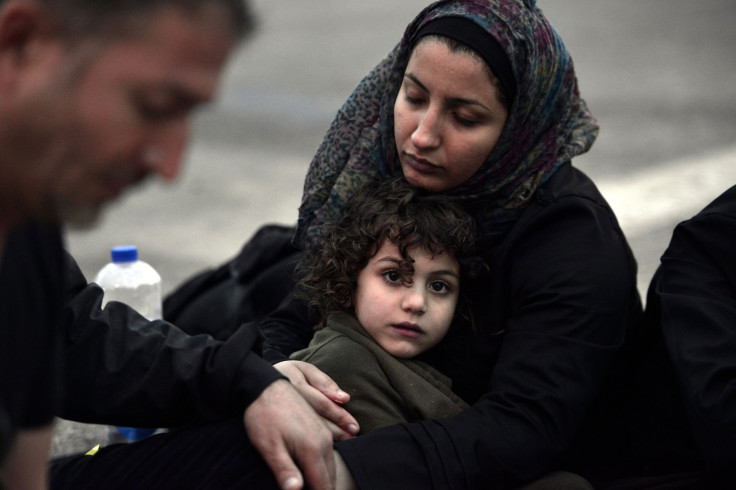Greece forgotten crisis: Lesbos on verge of 'catastrophe' as 1,000 refugees arrive ashore daily

The Greek island of Lesbos is facing a humanitarian crisis with debt-ridden authorities unable to cope with an unprecedented influx of Syrian and Afghan refugees from Turkey.
Aid workers on the island have described to IBTimes UK the "shocking and unimaginable" scenes at the hosting camps and along the route, with more than 3,000 asylum seekers with scarce or no access to water or sanitation facilities. "I have worked in emergency teams for the past 20 years and I've never seen anything like that," Kirk Day, the International Rescue Committee's local team leader said.
"The situation is particularly dire at the transit Kara Tepe Camp where until a few days ago only five toilets and two showers were operational. As a result, people were washing themselves at drinking water points, making them insanitary, and defecating out in the open. I couldn't think when it was the last time I saw a similar situation."
And it's true that the Kara Tepe camp is dirty and disorganized. #lesvos #refugees #greece #eurogroup pic.twitter.com/hyDiH699N4
— Julien Pain (@JulienPain) July 13, 2015Kara Tepe migrant detention camp in Lesvos. The real face of Europe https://t.co/jegQQEvVI4 #refugeesgr
— Asteris Masouras 正义 (@asteris) July 16, 2015Around 1,000 refugees arrive on the shores of Lesbos daily, of which 60% are from Syria and 30% from Afghanistan. After they come ashore on the north of the island, at the closest point to Turkey, the refugees have to walk around 40km (25 miles) to reach Kara Tepe because of a Greek anti-smugglers law making it illegal to provide transport for migrants.
The mayor of Lesbos, Spryos Galinos, said his hands are tied because it is illegal for him to transport people across the island. In an interview to the Mail Online in June, he said "every day it's like a new village is born".
It has been estimated that more than 25,000 people arrived on the island, which has a population of about 90,000 people, since the start of 2015. "If the flow doesn't stop, we can't cope. I'm making efforts [but] I create a centre for 400 people, and then 700 arrive in one day," he told the Mail.
The reality on the ground is that Greek officials are working in a difficult environment and under strict austerity measures and cuts, which have significantly reduced the ability to cope with the crisis. "In some days, there's no food available to feed people in the camps because the government doesn't have the money to pay the courier," Day said.
Day and other activists have stressed the "selflessness, dedication and generosity" of the Greek community, made of local activists but also common people, in helping the refugees.
My view after 5 days in #lesvos: Locals and volunteers are left alone to deal with the refugee crisis. A disgrace for Europe. #GreekCrisis
— Julien Pain (@JulienPain) July 16, 2015"If it wasn't for them, it would be far far worse," he said. "They are average citizens who say this is unacceptable." Groups of locals have arranged a car pool, in defiance of the law, to transport refugees from northern Lesbos the the camps.
Thanks to the volunteers, the camp of Kara Tepe was cleaned and the toilets made functional again. Doctors have arrived to the facility.
Just got news from Kara Tepe!!!! It is amazing what people power can do!!! Many people came!! also many from Mytilene!!...
Posted by Philippa Kempson on Thursday, July 16, 2015
Day also recounted the story of a 94-year-old Greek woman who got out of her bed to help Syrian refugees who landed on Lesbos. During the Second World War, she and her family had to flee to Syria because of the famine. She was hosted for six years by a Syrian family who treated her as one of their own. When she heard Syrian refugees were arriving ashore, she got out of the bed to distribute food and water.
"If a 94-year-old woman can get off her bed to help these people, where is Europe?" Day asked.
From Kara Tepe, the refugees are sent to Moria detention centre, which can hold only 500 people. In there, the asylum seekers can get registered, processed and see doctors. They stay there from two days to a week and then they can catch a ferry to mainland Greece.
Conditions at Moria camp are also appalling, according to Julien Pain of France 24:
Hundreds of migrants sleep near the Moria camp #lesvos. No water, no toilets. Unbearable conditions. #grexit pic.twitter.com/yIa1EEqcir
— Julien Pain (@JulienPain) July 14, 2015After they receive the documents, they are allowed to remain in Greece for between one and six months.
More migrants arrived on the island in June than in the whole of the previous year, according to the UN. There were about 15,000 arrivals in June as opposed to the 12,187 in 2014.
A spokesman for charity Medicins Sans Frontieres told the BBC the situation in Lesbos is the worst they had seen in Europe.
But the situation could even get worse in the next months, according to Day. He said: "Last year most of the arrivals happened in August and September. If we continue to get the same numbers we've seen in June and July, we can potentially have catastrophic consequences. There are 200,000 more refugees ready and waiting to come before the end of the year."
© Copyright IBTimes 2025. All rights reserved.




















